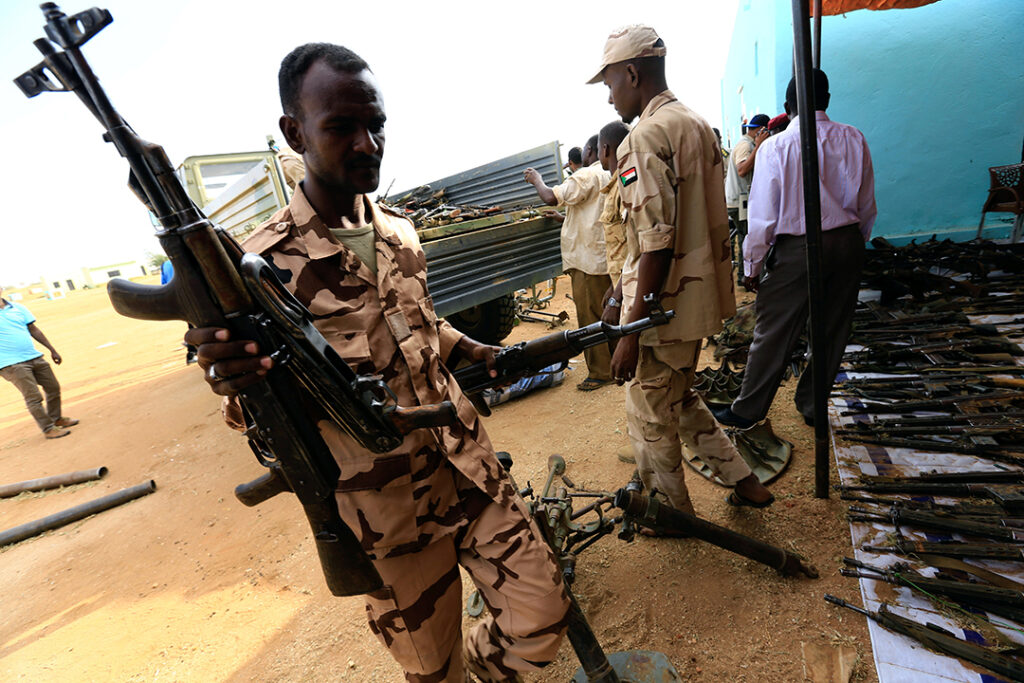ADF STAFF
For two days, members of the Sudanese Armed Forces (SAF) defended a military industrial facility in Yarmouk from attacks by the paramilitary Rapid Support Forces (RSF). On June 7, as a fire blazed near the site, the RSF posted a video claiming to have taken control of a warehouse filled with firearms and ammunition.
For experts tracking the violence, incidents like this confirm a fear that weapons could be looted and circulate inside and out of the country.
“Anywhere there are security breaches at weapons stockpile facilities then, yes, some of that materiel may find its way across borders and into neighboring states,” Khristopher Carlson, the Nairobi-based senior researcher and project coordinator for the Small Arms Survey, told ADF. “The possibility continues to exist as long as this conflict goes on and as long as those weapons stores and their security remains in doubt.”
Sudan is one of the largest weapons and ammunition manufacturers in Africa. The industry boomed in the 1990s under former dictator Omar al-Bashir with the establishment of the country’s Military Industry Corp. Al-Bashir used the weapons to arm loyal domestic groups and foreign fighters, including the Lord’s Resistance Army in northern Uganda and surrounding countries. The LRA was labeled a terrorist organization for its gruesome attacks that targeted civilians.
“He wanted to increase his military capacity, not only with the immediate military forces in Sudan, but also with others who had aligned political persuasions that could be called on for support,” Carlson said. “It allowed Bashir to get involved indirectly through these proxies in other conflicts in the region.”

Domestically, Sudan became a heavily armed nation. According to the SAS there are more than 3 million firearms in the country, most of them in the hands of private citizens. This makes it the second-most weaponized country in North or East Africa behind Egypt.
Now those vast stores of weapons are being used in a civil war. Carlson said the RSF and the SAF appear to hold ample supplies of small arms, light weapons (SALW) and ammunition. One of the most dangerous developments is a report that the RSF obtained Russian-made SA-18 portable surface-to-air missiles (MANPADS). These pose a threat to civilian and military aircraft.
“That is a development of quite some significance as the RSF continues to try to bolster its ability to defend against aerial strikes,” Carlson said.
The broader concern is that the insecurity will cause SALW to proliferate within the country and ignite other conflicts. In Darfur, desperate residents are paying $1,200 for a Kalashnikov rifle and $2 apiece for bullets, according to a France24 report. They say they have no choice.
“It is very easy to get weapons in Darfur: you just need enough money,” an anonymous resident told France24. “The financially well-off residents have been able to buy small arms to defend themselves. They cannot stand idly by.”
Carlson said in some parts of Darfur, government representatives are handing out weapons. The regional governor Minni Minnawi took to Twitter to urge citizens to arm themselves. This breakdown in order is causing demand for weapons to rise and, along with it, the risk that the violence will spread.
“It demonstrates a lack of formal security,” Carlson said. “Civilians are being called upon to deal with this on their own because the state realizes that it can’t protect them.”

